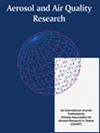基于微、纳米粉尘分离的室内外空气微生物群组成分析
IF 2.5
4区 环境科学与生态学
Q3 ENVIRONMENTAL SCIENCES
引用次数: 0
摘要
空气传播的微生物与人类健康密切相关,纳米细胞外囊泡(ev)对健康的重要影响已引起人们的重视。因此,我们通过在韩国首尔进行实地研究,分析了室外和室内空气中的微尺度微生物(m- mb)和纳米尺度微生物ev (n- mev)。我们对室外空气粉尘(OAD)、室内空气粉尘(IAD)和室内地毯粉尘(IDC)中的m- mb和n- mev进行了基于16S rdna的宏基因组分析。OAD的优势类群随外界环境(如晴天、雾霾和雨天)的变化而变化。此外,IAD和IDC的优势类群也随着外界环境的变化而发生变化。此外,在OAD、IAD和IDC中,m-MB和n-MEV之间的微生物组组成和多样性存在差异。OAD的m-MB与IDC的相关性更强,而OAD的n- mev与IAD的相关性更强。因此,根据生物气溶胶的大小,不同的来源会对室内生物气溶胶产生影响。此外,生物气溶胶的风险因优势类群的不同而不同,因此我们认为有必要根据环境进一步研究优势类群的风险。我们建议将纳米级微生物电动汽车作为空气质量管理的参数本文章由计算机程序翻译,如有差异,请以英文原文为准。
Composition Analysis of Airborne Microbiota in Outdoor and Indoor Based on Dust Separated by Micro-sized and Nano-sized
Airborne microorganisms are associated with human health and awareness of the important influence of nano-sized extracellular vesicles (EVs) on health has risen. Thus, we analyzed the micro-sized microbes (m-MBs) and nano-sized microbial EVs (n-MEVs) of outdoor and indoor air through a field study in Seoul, Korea. We conducted 16S rDNA-based metagenomic analysis of m-MBs and n-MEVs in outdoor airborne dust (OAD), indoor airborne dust (IAD), and indoor dust from carpets (IDC). The dominant taxa in OAD were altered depending upon the outside environment, such as sunny, haze, and rainy. Also, dominant taxa in IAD and IDC were changed depending on the outside environment. In addition, there were differences of microbiome composition and diversity between the m-MB and n-MEV in OAD, IAD, and IDC. m-MB in OAD were more correlated with that of IDC, whereas n-MEVs in OAD were more related to those in IAD. Thus, indoor bioaerosols can be affected by different source according to bioaerosol size. Additionally, risk of bioaerosols can be different according to dominant taxa, and therefore we suggested that further study for risk of dominant taxa according to environments is necessary. We suggested that nano-sized microbial EVs should be included as parameters to manage air quality
求助全文
通过发布文献求助,成功后即可免费获取论文全文。
去求助
来源期刊

Aerosol and Air Quality Research
ENVIRONMENTAL SCIENCES-
CiteScore
8.30
自引率
10.00%
发文量
163
审稿时长
3 months
期刊介绍:
The international journal of Aerosol and Air Quality Research (AAQR) covers all aspects of aerosol science and technology, atmospheric science and air quality related issues. It encompasses a multi-disciplinary field, including:
- Aerosol, air quality, atmospheric chemistry and global change;
- Air toxics (hazardous air pollutants (HAPs), persistent organic pollutants (POPs)) - Sources, control, transport and fate, human exposure;
- Nanoparticle and nanotechnology;
- Sources, combustion, thermal decomposition, emission, properties, behavior, formation, transport, deposition, measurement and analysis;
- Effects on the environments;
- Air quality and human health;
- Bioaerosols;
- Indoor air quality;
- Energy and air pollution;
- Pollution control technologies;
- Invention and improvement of sampling instruments and technologies;
- Optical/radiative properties and remote sensing;
- Carbon dioxide emission, capture, storage and utilization; novel methods for the reduction of carbon dioxide emission;
- Other topics related to aerosol and air quality.
 求助内容:
求助内容: 应助结果提醒方式:
应助结果提醒方式:


